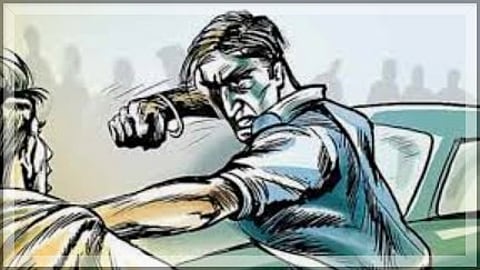

The tragic and untimely death of former Ponda MLA Lavoo Mamledar, following a scuffle with a rickshaw driver in Belagavi is a stark reminder of the dangerous escalation of road rage and how seemingly minor disputes are turning fatal. The cultural and geographical proximity between Goa and Belagavi ensures that many Goans make frequent visits to this city. Thus, the nature of this tragic event brings to the forefront a troubling pattern that has plagued not only Goa but several regions across the country – the disturbing rise of road rage, altercations, and fatalities that stem from minor traffic disputes.
In Mamledar’s case, a petty accident involving a slight bump between a car and an autorickshaw led to a heated exchange that spiralled into fatal violence. Although the exact circumstances are under investigation, the tragic outcome underscores a deeper issue—how can a simple road incident result in the loss of life? Sadly, this is not an isolated incident. Goa, in recent years, has experienced an uptick in road rage incidents that often culminate in serious injuries or even death. The broader implications of these incidents extend well beyond the local roads and into the very fabric of Goa's economy.
Goa’s tourism industry has borne the brunt of this increasing violence. The state, which relies heavily on tourism, has been suffering due to the negative publicity surrounding road-related altercations. Accounts of tourists being attacked or dying in road incidents have led to a tarnished image of the state. Tourists, both domestic and international, have expressed concerns over their safety, and many are opting for alternative destinations. The financial implications of this decline are profound, as businesses dependent on tourism have suffered. While the Goa government has stepped in to address these concerns with measures aimed at improving road safety, the road to resolution remains long and fraught with challenges.
The fundamental question we must ask is: how have we allowed life to become so cheap that a minor road dispute can escalate into a fatal altercation? This question strikes at the heart of the problem. The Mamledar incident was a clear demonstration of how poor conflict resolution and unchecked road aggression can have tragic consequences. What is more disturbing is that this escalation is no longer seen as exceptional. On the roads of Goa and indeed across India, arguments between drivers often turn physical, sometimes with deadly results. It is essential to reflect on why this behaviour is becoming more common and alarmingly, more accepted.
There is a pressing need for greater education in road safety and conflict resolution. To prevent further tragedies, road rage awareness and de-escalation training should be made mandatory for all individuals before they are granted a driving licence. Such initiatives are not merely educational but a necessary step towards fostering a culture of responsibility and respect on the roads.
Furthermore, the consequences for drivers who exhibit aggressive behaviour must be more severe. Should licences be revoked for drivers who repeatedly display poor road etiquette and aggressive behaviour? Driving is a privilege, not a right and those who endanger others on the road should face strict repercussions.
Another critical consideration is the role of mental health, particularly in the post-Covid era. The pandemic has had far-reaching effects on the mental well-being of individuals. Stress, anxiety, and post-Covid fatigue have affected many, potentially exacerbating road rage incidents. Are we adequately addressing these issues? It is worth exploring whether mandatory psychological assessments should be included as part of the process for obtaining a driving licence. After all, someone who is mentally unfit to drive poses a risk not only to themselves but to others as well.
The rise in road violence also raises a fundamental societal question: are we normalising aggression as an acceptable response to conflict? It is deeply troubling that physical violence is becoming an increasingly common reaction to minor road disputes. This cultural shift has serious implications, particularly in Goa, where tourism is a cornerstone of the economy. If tourists no longer feel safe due to rising road violence, they will understandably choose other destinations. The resulting decline in tourism would have devastating consequences for local businesses and workers who depend on a vibrant tourist trade.
In this context, we must ask ourselves: what kind of society do we want to be? One where violence is an accepted solution, or one where dialogue, patience, and mutual respect prevail? The tragic death of Lavoo Mamledar should serve as a wake-up call for all of us. It is time for a collective reassessment of our attitudes towards road safety and conflict resolution.
The responsibility lies not only with individual drivers but with the government, law enforcement, and society at large. The current approach to road safety is insufficient, and more comprehensive measures are needed to address the root causes of road rage and violence. Conflict de-escalation training, stricter penalties for aggressive behaviour, and better mental health support for drivers are essential steps in fostering a safer environment.